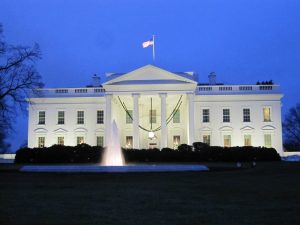In the case of Defenders of Wildlife. et al., v. Zinke., et al., the U.S. Court of Appeals for the DC Circuit reversed the U.S.  District Court for the District of Columbia, and reinstated the U.S. Department of the Interior’s 2012 decision to delist the Wyoming Gray Wolf, which had been listed as an endangered species under the Endangered Species Act (ESA) in 1973. The District Court vacated the rule, holding that the Fish and Wildlife Service’s determination that that the State of Wyoming had put in place adequate regulatory mechanisms in the conservation management plan of the State of Wyoming (Wyoming Management Plan) to protect the wolf was arbitrary.
District Court for the District of Columbia, and reinstated the U.S. Department of the Interior’s 2012 decision to delist the Wyoming Gray Wolf, which had been listed as an endangered species under the Endangered Species Act (ESA) in 1973. The District Court vacated the rule, holding that the Fish and Wildlife Service’s determination that that the State of Wyoming had put in place adequate regulatory mechanisms in the conservation management plan of the State of Wyoming (Wyoming Management Plan) to protect the wolf was arbitrary.
Changed Circumstances Warrant Modifications To Injunction
In Government of the Province of Manitoba v. Zinke, the U.S. Court of Appeals for the DC Circuit reversed the U.S. District Court for the District of Columbia and held that the State of North Dakota could begin designing a water treatment plant for an area of North Dakota whose public drinking water quality has been substandard for a long time. The project is known as the Northwest Area Water Supply Project. The District Court had rejected the State’s request to modify an injunction that kept the project from moving forward. Reviewing the District Court’s ruling, the DC Circuit has held that the District Court abused its discretion in not accepting North Dakota’s argument that a significant change in circumstances warranted this relief.
What’s In Store For Electric Storage Resources?
In Energy Storage: Finding New Home with FERC Policy Statement and Notice of Proposed Rulemaking, my colleagues Michael Hindus, Kevin Ashe and I discuss the Federal Regulatory Agency Commission’s (FERC) November 2016 notice of proposed rulemaking (NOPR), January 19 policy statement confirming that electric storage resources may be able to recover both cost-based and market-based rates, and market participates’ comments on the FERC’s NOPR. Market participants seeking to bring storage resources to the wholesale electricity marketplace are encouraged to consider the implications of these recent efforts to incorporate electric storage on a wider scale.
Executive Order For Review of WOTUS Rule
Earlier today, we published our client alert Trump Administration Seeks to Limit Coverage of Clean Water Act, Executive order to set out a new definition of “Waters of the United States” discussing a February 28, 2017 executive order directing that the Waters of the United States Rule (commonly referred to as the WOTUS Rule) be reviewed and revised or repealed. Although the executive order starts the process, its completion is expected to take at least a year or two given the formal administrative process required for repeal or replacement. In 2016, the WOTUS rule was stayed by the Sixth Circuit Court of Appeals pending further action. The repeal will be significant for project developers, such as solar projects and real estate developers, as well as for farmers and ranchers, mining companies and other energy companies. More administrative actions are expected given the aggressive approach by the Trump Administration to roll back the Obama Administration’s regulation on this issue.
Additional Source: Presidential Executive Order on Restoring the Rule of Law, Federalism, and Economic Growth by Reviewing the “Waters of the United States” Rule; Construction Industry to See Greater Federal Footprint in Projects with New “Waters of the United States” Rule
Texas Supreme Court Reverses Two Court of Appeals Decisions Involving Environmental Issues
On February 24, the Texas Supreme Court released several decisions, including two rulings involving aspects of environmental law. The cases are ExxonMobil Corporation v. Lazy R Ranch, et al., and ExxonMobil Pipeline Company, et al., v. Coleman.
POTUS Executive Order “Enforcing the Regulatory Reform Agenda”
Referencing Executive Orders issued by past administrations, on February 24, 2017, President Trump issued a new  Executive Order: “Enforcing the Regulatory Reform Agenda.” The Executive Order establishes new procedures and timelines by which most federal administrative agencies must conduct their regulatory planning and review.
Executive Order: “Enforcing the Regulatory Reform Agenda.” The Executive Order establishes new procedures and timelines by which most federal administrative agencies must conduct their regulatory planning and review.
TX High Court Clarifies “Common Carrier” Status Criteria
In The Texas Supreme Court Clarifies “Common Carrier” Status Criteria, Pillsbury attorneys Anthony Raven, Olivia Matsushita and Andrew White discuss the Texas Supreme Court’s recent opinion in Denbury Green Pipeline-Texas, LLC v. Texas Rice Land Partners, Ltd. Among other things, the Court provides judicial clarity on the “reasonable probability” public use test that might positively demonstrate that a pipeline owner is a common carrier for the purposes of Texas law. Affected private landowners will still be able to challenge a CO pipeline owner’s self-designation as a common carrier.
Additional Source: Securing Rights-of-Way to CO2 Pipeline Corridors in the United States; The Future of Carbon Dioxide Injection EOR in the United States
Employers Beware of W-2 Phishing Scams
In Phishing for W-2s: IRS Warns of Expanding Cyber Scam, Pillsbury attorneys Catherine Meyer and Kate Nyce caution all employers to be aware of and protect against cybercriminals scamming employers into turning over their employees’ W-2s.
all employers to be aware of and protect against cybercriminals scamming employers into turning over their employees’ W-2s.
Photo: Blogtrepreneur, Data Breach – Creative Commons
GAO Clarifies Whether An Agency Is Required To Or May Credit An Offeror For Its Subcontractor’s Past Performance
In its recent Atlantic Systems decision, the Government Accountability Office clarified whether an agency is required or simply has discretion to credit past performance references submitted on behalf of an offeror’s proposed subcontractor. The answer: it depends on the type of procurement. For more information, read our Taking Credit for Subcontractor Past Performance GAO clarifies when an agency may decline to evaluate a proposed subcontractor’s past performance references.
Additional Source: Matter of Atlantic Systems Group, Inc., File B-413901; B-413901.2, Decision (Jan. 9, 2017)
Supreme Judicial Court of Massachusetts Confirms Anti-Slapp Provisions Apply To “Protected Petition Activity”
On February 14, the Supreme Judicial Court of Massachusetts reviewed the application of the state’s “anti-SLAPP” law to challenges made against a blogged critique of Cardno Chemrisk, LLC (Chemrisk) and British Oetroleum (BP) in the case of Cardno Chemrisk, LLC v. Cherri Foytlin & Another, confirming that it protects pamphleteers/bloggers. Continue Reading ›




